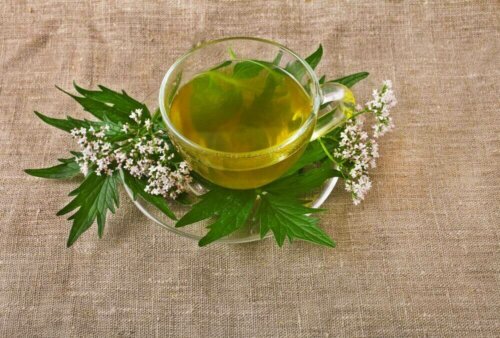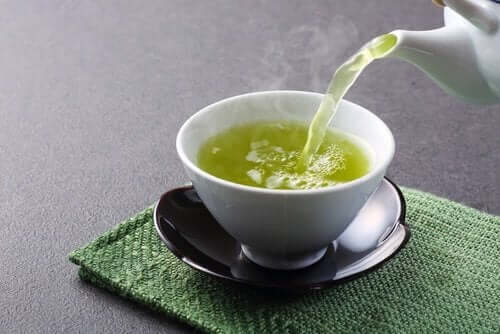Four Relaxing Infusions You Can Make at Home

You must try at least one of these four relaxing infusions. Life is often extremely demanding, but you already know that. An excess of stimuli in big cities and worries are the order of the day. Thus, we could all use a way to relax and make it through the more difficult days.
There are relaxing infusions for every occasion, and some of them are great when you’re dealing with a particularly stressful situation and you need to recover your balance. Others help you fall asleep or at least help tone down restlessness.
Best of all, these infusions are completely natural and have no side effects — for the most part. This is because only some of them are contraindicated in people with chronic illnesses.
Four relaxing infusions
There are different types of infusions to relax and the extent depends on their own particular effect. All of them bring peace of mind though. However, stress doesn’t always manifest in the same way. It sometimes appears as anxiety, other times as migraine or insomnia.
The main types of relaxing infusions are:
- Sleeping infusions. These aid with sleep disturbances, insomnia in particular.
- Infusions for anxiety. They’re great during highly stressful times or emotional crises. They also hydrate you and provide antioxidants.
- Infusions to lower tension. Blood pressure is highly sensitive to mood. In fact, it’s due to stress, most of the time, and even leads to anxiety. A relaxing infusion can help regulate it.
- For headaches. Stressful situations can easily manifest in headaches or migraines. Some herbal infusions can provide relief.
Discover Five Infusions with Medicinal Plants that Detoxify the Blood
Let’s see which four infusions can help you relax.
1. Sleep like a baby with a valerian infusion

Valerian is one of the most effective relaxing infusions. This wonderful plant is easy to find and ideal for insomniacs. In fact, a study published in The American Journal of Medicine revealed it can improve the quality of sleep. The evidence is still limited though.
You can make an infusion with either the leaves or the root and you can use both at the same time. Just add a spoonful to a cup of boiling water and let it steep for 5 minutes before drinking it. Note that it’s toxic in large quantities so you must take breaks from it.
2. Passionflower is one of the four relaxing infusions
Passionflower, also known as “passiflora,” was systematically used by ancient doctors to help people relax. It’s a powerful herb and you should never consume it along with anxiolytics.
It’s also an analgesic and produces some euphoria, so it’s a common prescription for depression. Make the infusion by adding a spoonful of the plant into a cup of hot water. Cover it and let it steep for five minutes. It isn’t suitable for children under four years of age.
3. Green tea for hypertension

Green tea is useful to counteract various health problems. It relaxes the circulatory system and this is why it’s one of the most recommended plants to treat hypertension. Not only does it help regulate the pressure, but it also keeps it stable.
Add a teaspoon of green tea to a cup of boiling water; cover it and let it steep for 10 to 15 minutes. Then, strain it and drink it. You may have one or two cups a day for three days in a row if the blood pressure continues to be on the rise.
Read also Four Infusions to Cleanse Your Body
4. Lavender is a great antidote for migraine
A lavender infusion is one of the most relaxing ones and it’s also helpful for keeping migraines in check. It doesn’t only have medicinal properties but also a rather pleasant aroma. In fact, it contains more than 150 active components that highly benefit the nervous system.
The best way to make an infusion with this plant is by adding a spoonful of lavender flowers to a cup of hot water. Cover and let it steep for about 20 minutes. Then, filter it and add some drops of lime or lemon and sweeten it with honey if you like. Drink it three times a day for one week. Then, rest for a week and repeat the cycle.
Are you affected by stress or anxiety? Are you having difficulty sleeping? Make one of these four infusions and enjoy its benefits. However, it’s very important to consult your doctor to learn about other treatment options if the problem continues or becomes chronic.
All cited sources were thoroughly reviewed by our team to ensure their quality, reliability, currency, and validity. The bibliography of this article was considered reliable and of academic or scientific accuracy.
- Barton DL, Atherton PJ, Bauer BA, et al. The use of Valeriana officinalis (Valerian) in improving sleep in patients who are undergoing treatment for cancer: a phase III randomized, placebo-controlled, double-blind study (NCCTG Trial, N01C5). J Support Oncol. 2011;9(1):24–31. doi:10.1016/j.suponc.2010.12.008
- Elsas SM, Rossi DJ, Raber J, et al. Passiflora incarnata L. (Passionflower) extracts elicit GABA currents in hippocampal neurons in vitro, and show anxiogenic and anticonvulsant effects in vivo, varying with extraction method. Phytomedicine. 2010;17(12):940–949. doi:10.1016/j.phymed.2010.03.002
- Peng X, Zhou R, Wang B, et al. Effect of green tea consumption on blood pressure: a meta-analysis of 13 randomized controlled trials. Sci Rep. 2014;4:6251. Published 2014 Sep 1. doi:10.1038/srep06251
- Farnsworth, N. R., Akerele, O., Bingel, A. S., Soejarto, D. D., & Guo, Z. (1989). Las plantas medicinales en la terapéutica.
- Koulivand PH, Khaleghi Ghadiri M, Gorji A. Lavender and the nervous system. Evid Based Complement Alternat Med. 2013;2013:681304. doi:10.1155/2013/681304
This text is provided for informational purposes only and does not replace consultation with a professional. If in doubt, consult your specialist.








